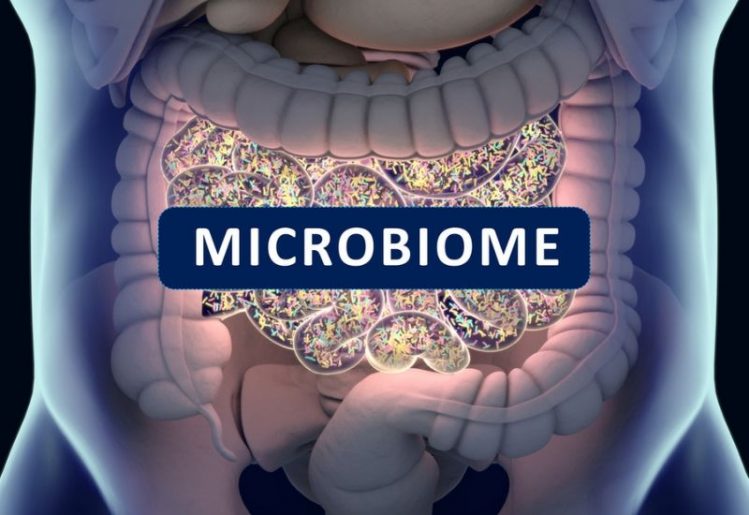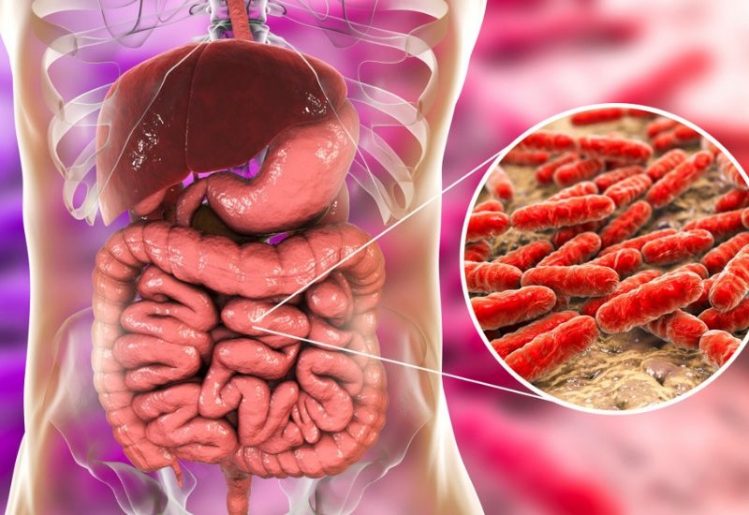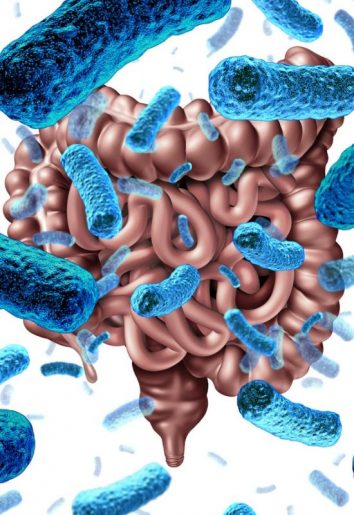While your body is comprised of trillions of human cells, it’s also home to trillions of fungi, bacteria and other foreign microbes. A large portion of these reside in the large intestine, and scientists refer to this community as the “gut microbiome.” Until fairly recently, little attention was paid to this realm, but we now recognize that the microbes housed in the large intestine serve a variety of essential functions. In fact, we now consider the gut microbiome to be an extra organ that functions to help us stay healthy. Now, a newly discovered link between gut bacteria and cancer may hold important answers for the prevention and treatment of breast cancer in women.
How Does the Gut Microbiome Affect Overall Health?
 The most studied microbes in the large intestine are bacteria, because there are so many different kinds of bacteria in the body. There are actually more bacterial cells than there are human cells in the body. There are over 1,000 different types of bacteria that reside in the human body, and researchers have found that each kind of bacteria performs a unique function. Some of these bacteria are harmful, increasing the likelihood of developing specific medical conditions. Other types of bacteria are good for us, helping to maintain health and boost immunity. A diverse and well-balanced gut microbiome has been found to play a significant role in overall health and wellness.
The most studied microbes in the large intestine are bacteria, because there are so many different kinds of bacteria in the body. There are actually more bacterial cells than there are human cells in the body. There are over 1,000 different types of bacteria that reside in the human body, and researchers have found that each kind of bacteria performs a unique function. Some of these bacteria are harmful, increasing the likelihood of developing specific medical conditions. Other types of bacteria are good for us, helping to maintain health and boost immunity. A diverse and well-balanced gut microbiome has been found to play a significant role in overall health and wellness.
When we are born, some microbes already inhabit the gut microbiome, enabling us to digest certain foods. The population of microbes in the large intestine starts to grow almost as soon as we’re born. Both our mother’s breast milk and the air we breathe contain bacteria that make their way into the gut microbiome. Once there, they begin to provide us with many healthy benefits. As we develop dietary tastes and pursue new experiences, still more types of microbes are ingested, helping to create a more diverse gut microbiome.
Cultivating a fully diverse gut microbiome will ultimately benefit overall health by:
- Assisting in the digestion of fiber. Certain types of bacteria can help the body digest fiber more efficiently. This may help you lower your risks of developing obesity, type 2 diabetes, heart disease and some types of cancer.
- Improving immune system functioning. Research has found that the gut microbiome communicates with the body’s immune system. A diverse bacterial population can communicate better with immune cells, strengthening protection against infection and disease.
- Maintaining brain health. More recent research has found evidence that healthy brain functioning is supported by the gut microbiome. The microbes in your large intestine communicate with the central nervous system, which sends messages to the brain. In this way, a diverse gut microbiome may help stave off cognitive degeneration.
New Study Links Gut Bacteria and Cancer
 Today, the methods for treating breast cancer have improved considerably, offering a better chance for women suffering from the condition. However, metastatic breast cancer is a more complicated concern in that it involves treating cancer that has spread to other parts of the body. Unfortunately, metastatic breast cancer is a growing problem that already affects more than 154,794 women annually. In many cases, breast cancer has already metastasized by the time patients are diagnosed.
Today, the methods for treating breast cancer have improved considerably, offering a better chance for women suffering from the condition. However, metastatic breast cancer is a more complicated concern in that it involves treating cancer that has spread to other parts of the body. Unfortunately, metastatic breast cancer is a growing problem that already affects more than 154,794 women annually. In many cases, breast cancer has already metastasized by the time patients are diagnosed.
Most women develop HR (hormone receptor)-positive breast cancer, which is a type of cancer that’s driven by hormone production. Specifically, progesterone and estrogen are responsible for the growth of this type of cancer. HR-positive breast cancer responds well to treatment and is less likely to spread to other parts of the body.
However, HR-negative breast cancer isn’t so easily treated. It often metastasizes in the early stages, making it more difficult to treat. In addition to increased hormone levels, a high population of immune cells, called macrophages, can also increase the likelihood of advanced breast cancer. When there’s also an increase of collagen, which is a structural protein found in human tissue, the chances of breast cancer spreading to other areas of the body is maximized.
Looking for ways to prevent metastatic breast cancer has led some researchers to uncover a link between gut bacteria and cancer. A study conducted at Charlottesville’s University of Virginia sought to understand how gut bacteria influence the development and spread of breast cancer. In the study, mice with HR-positive mammary cancer were administered powerful antibiotics, which targeted the gut microbiomes of the test mice. Additionally, unbalanced gut microbiomes were transferred into the mice via fecal samples to ensure the processes normally conducted by the gut microbiome were inhibited.
Dr. Melanie Rutkowski reported that as a result of disrupting the gut microbiome’s processes, inflammation spread to the mammaries. The increased inflammation made it possible for cancer cells to be carried by the blood to the lungs, which is where breast cancer often first metastasizes. Dr. Rutkowski believes the research suggests that the health of the gut microbiome can indicate the likelihood of developing metastatic breast cancer.
Although the study used antibiotics to achieve these results, Dr. Rutkowski says the research isn’t meant to imply that antibiotics are harmful to women with breast cancer. She points out that a human dose of antibiotics proportionate to that used in the study would be far greater than anything a doctor would prescribe. What she does hope people will take away from this study is that maintaining a healthy and diverse gut microbiome is essential to good health.
To ensure an optimally healthy gut microbiome, eat a healthy diet, consisting of larger portions of plant-based foods, whole grains and lean meat. Taking a high-quality prebiotic/probiotic supplement can offer additional support for maintaining a healthy gut microbiome. Frequent exercise and quality sleep will also help the gut microbiome thrive and that will help to strengthen general immunity.
 Each person’s gut microbiome is different, depending upon the bacteria and viruses to which we have been exposed. Some of this exposure occurs in the womb, but our gut microbiome is also influenced by our diets and environmental factors. While the bacteria in each person’s body is different, it is important that every gut microbiome maintain a balance of good and bad microbes. Recent research has found that an imbalance can expose us to disease and can even weaken the immune system.
Each person’s gut microbiome is different, depending upon the bacteria and viruses to which we have been exposed. Some of this exposure occurs in the womb, but our gut microbiome is also influenced by our diets and environmental factors. While the bacteria in each person’s body is different, it is important that every gut microbiome maintain a balance of good and bad microbes. Recent research has found that an imbalance can expose us to disease and can even weaken the immune system. In another study, researchers looked at how non-caloric artificial sweeteners would affect human subjects when
In another study, researchers looked at how non-caloric artificial sweeteners would affect human subjects when  Numerous studies have presented strong evidence that getting proper levels of certain crucial vitamins can help lower the risk of major chronic disease that comes with age. This research suggests that many health problems could be avoided by simply increasing the amount of vitamins we ingest on a daily basis.
Numerous studies have presented strong evidence that getting proper levels of certain crucial vitamins can help lower the risk of major chronic disease that comes with age. This research suggests that many health problems could be avoided by simply increasing the amount of vitamins we ingest on a daily basis. As people age, one of the biggest problems they face is decreased mobility, defined as the ability to move around independently. It has been determined that 30 percent of seniors do experience mobility problems. Mobility is often inhibited by long-term health conditions, such as lung disease, heart disease and arthritis. At the same time, with age, muscles, bones and tissue deteriorate, inhibiting mobility. Now, recent research into the link between vitamins and aging may have found a solution: A new study suggests an increased intake of vitamin K, commonly found in leafy green vegetables, may help boost mobility in seniors.
As people age, one of the biggest problems they face is decreased mobility, defined as the ability to move around independently. It has been determined that 30 percent of seniors do experience mobility problems. Mobility is often inhibited by long-term health conditions, such as lung disease, heart disease and arthritis. At the same time, with age, muscles, bones and tissue deteriorate, inhibiting mobility. Now, recent research into the link between vitamins and aging may have found a solution: A new study suggests an increased intake of vitamin K, commonly found in leafy green vegetables, may help boost mobility in seniors. A joint project, which brought together researchers from the U.K.’s University of East Anglia and Harvard University, looked at how eating blueberries affected the development of heart disease and type 2 diabetes. The research was intended to identify how blueberry consumption affected metabolic syndrome. Metabolic syndrome is a term used to describe a situation in which an individual suffers from high blood pressure, obesity and high blood sugar. Heightened triglyceride and cholesterol levels are also common in people suffering from metabolic syndrome. When these conditions are present for an extended period of time, the individual develops increased
A joint project, which brought together researchers from the U.K.’s University of East Anglia and Harvard University, looked at how eating blueberries affected the development of heart disease and type 2 diabetes. The research was intended to identify how blueberry consumption affected metabolic syndrome. Metabolic syndrome is a term used to describe a situation in which an individual suffers from high blood pressure, obesity and high blood sugar. Heightened triglyceride and cholesterol levels are also common in people suffering from metabolic syndrome. When these conditions are present for an extended period of time, the individual develops increased  In a separate experiment, rats were given proportionate doses of anthocyanin. One of the compounds produced was vanillic acid, which was found to lower blood pressure. This may indicate that blueberries can be effective in helping patients treat hypertension, though more research is needed.
In a separate experiment, rats were given proportionate doses of anthocyanin. One of the compounds produced was vanillic acid, which was found to lower blood pressure. This may indicate that blueberries can be effective in helping patients treat hypertension, though more research is needed. Autism affects one out of every 59 children born in the United States, and is more common in boys than in girls. A look at past statistics shows that incidences of autism have nearly doubled over the past 14 years. If your child has autism, you already know that the condition affects their ability to interact with others. It can be hard to identify in some children, because it can affect each person differently. Autism may not be curable as of yet, but it can be treated. To obtain the best results from treatment, it’s important to begin as soon as possible. This means being able to recognize the signs and symptoms of autism, such as:
Autism affects one out of every 59 children born in the United States, and is more common in boys than in girls. A look at past statistics shows that incidences of autism have nearly doubled over the past 14 years. If your child has autism, you already know that the condition affects their ability to interact with others. It can be hard to identify in some children, because it can affect each person differently. Autism may not be curable as of yet, but it can be treated. To obtain the best results from treatment, it’s important to begin as soon as possible. This means being able to recognize the signs and symptoms of autism, such as: New research has found a link between gut bacteria and autism. The findings were the result of a research project intending to see if the common gastrointestinal problems experienced by most autistic children could be treated. Researchers at Arizona State University hoped to alleviate gastrointestinal problems experienced by
New research has found a link between gut bacteria and autism. The findings were the result of a research project intending to see if the common gastrointestinal problems experienced by most autistic children could be treated. Researchers at Arizona State University hoped to alleviate gastrointestinal problems experienced by  In general terms, the more diverse your gut microbiome, the better your health. Research has found that infants with a limited gut microbiome are more likely to develop allergies to peanuts and dairy products. As we expose ourselves to new microbes through a diverse diet and new environments, our gut microbiomes will grow accordingly. Here are just a few
In general terms, the more diverse your gut microbiome, the better your health. Research has found that infants with a limited gut microbiome are more likely to develop allergies to peanuts and dairy products. As we expose ourselves to new microbes through a diverse diet and new environments, our gut microbiomes will grow accordingly. Here are just a few  As we get older, our gut microbiomes go through changes just like other aspects of our health. As a result, the gut immune response becomes inhibited, opening the door to a variety of gastrointestinal illnesses. However, a study at the Babraham Institute in the United Kingdom has provided new hope that the gut microbiome could possibly be restored to full functionality.
As we get older, our gut microbiomes go through changes just like other aspects of our health. As a result, the gut immune response becomes inhibited, opening the door to a variety of gastrointestinal illnesses. However, a study at the Babraham Institute in the United Kingdom has provided new hope that the gut microbiome could possibly be restored to full functionality.